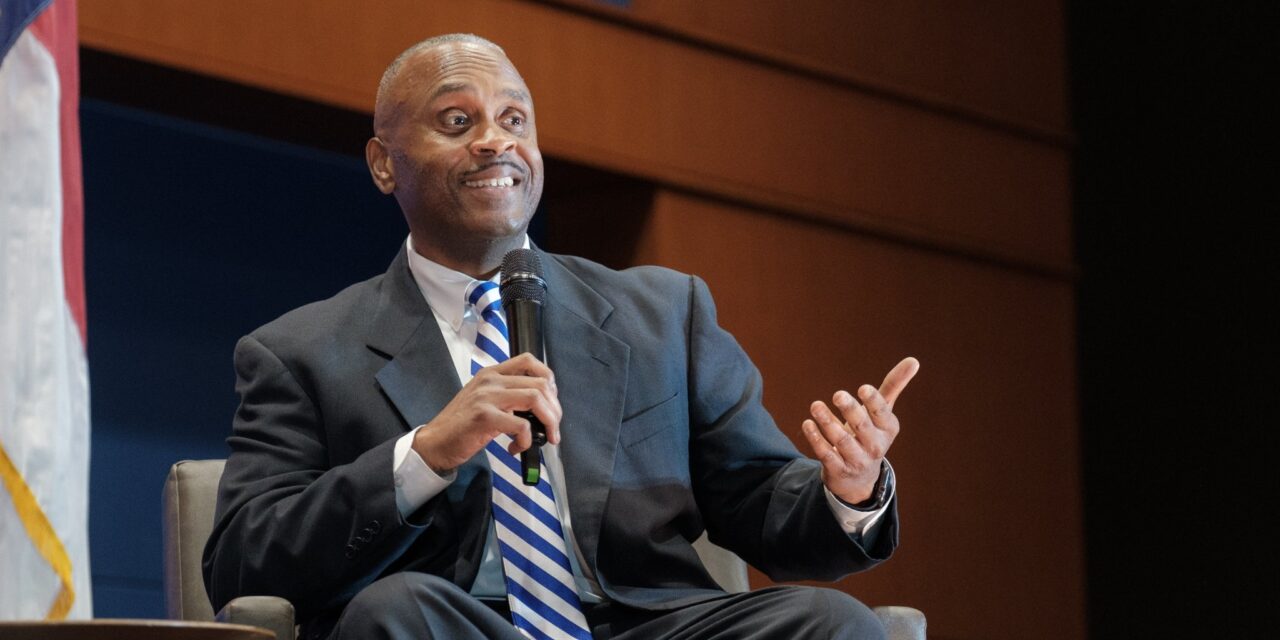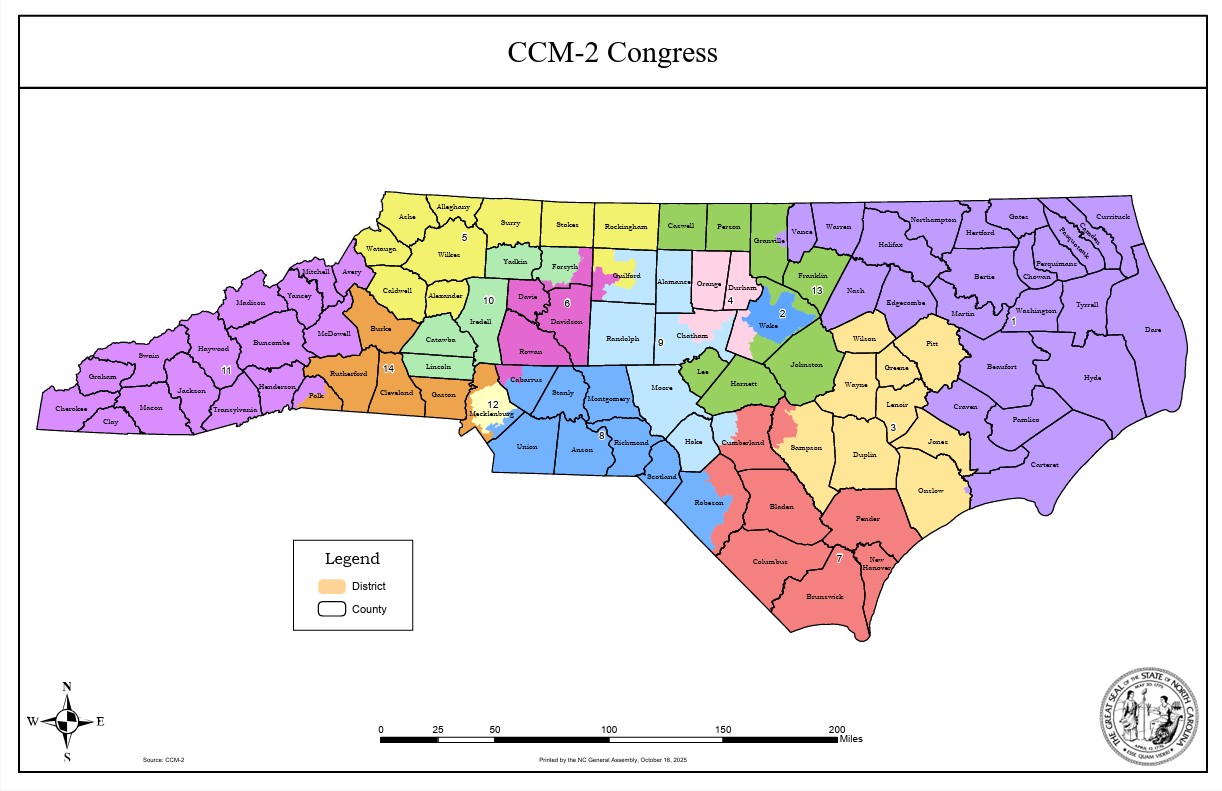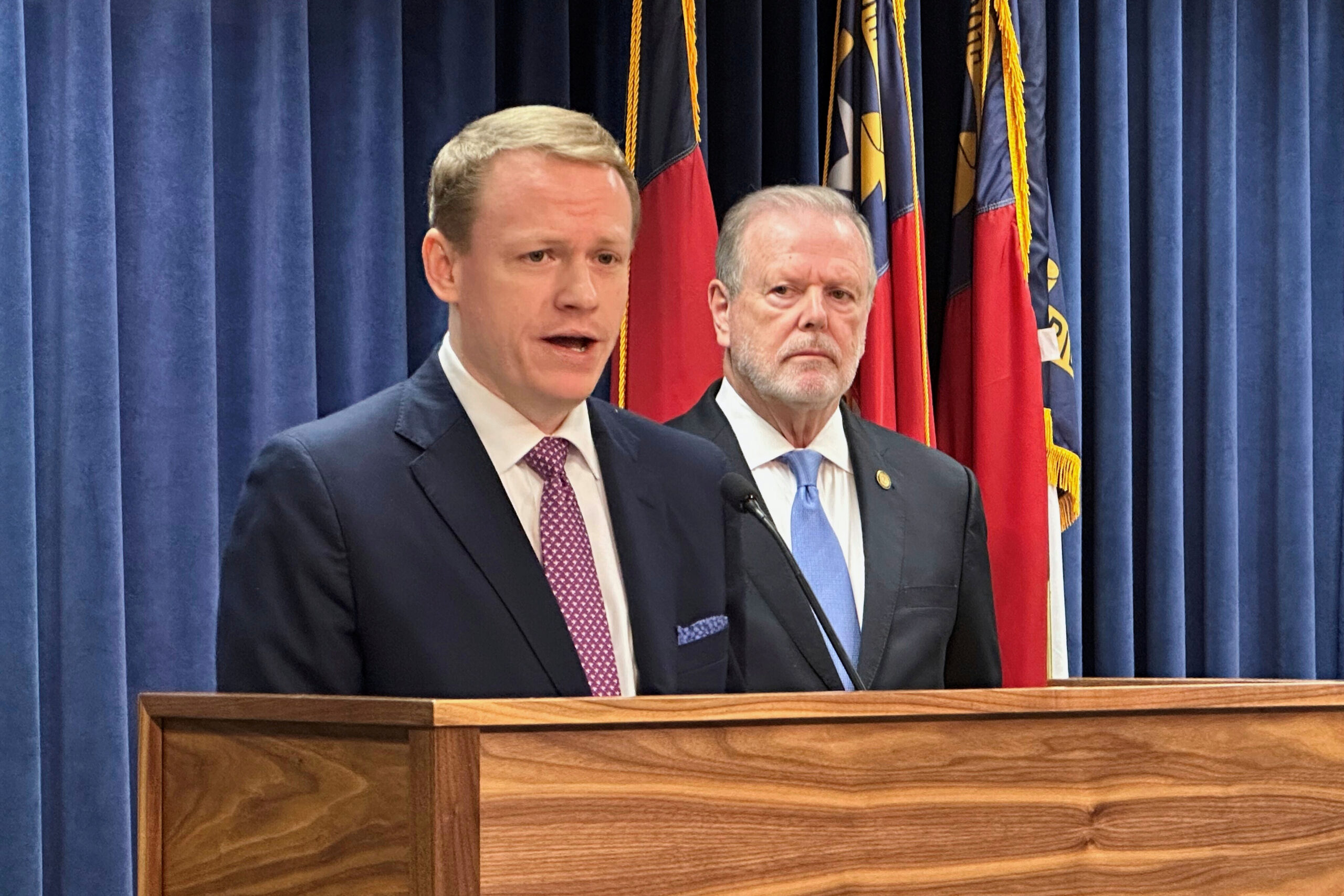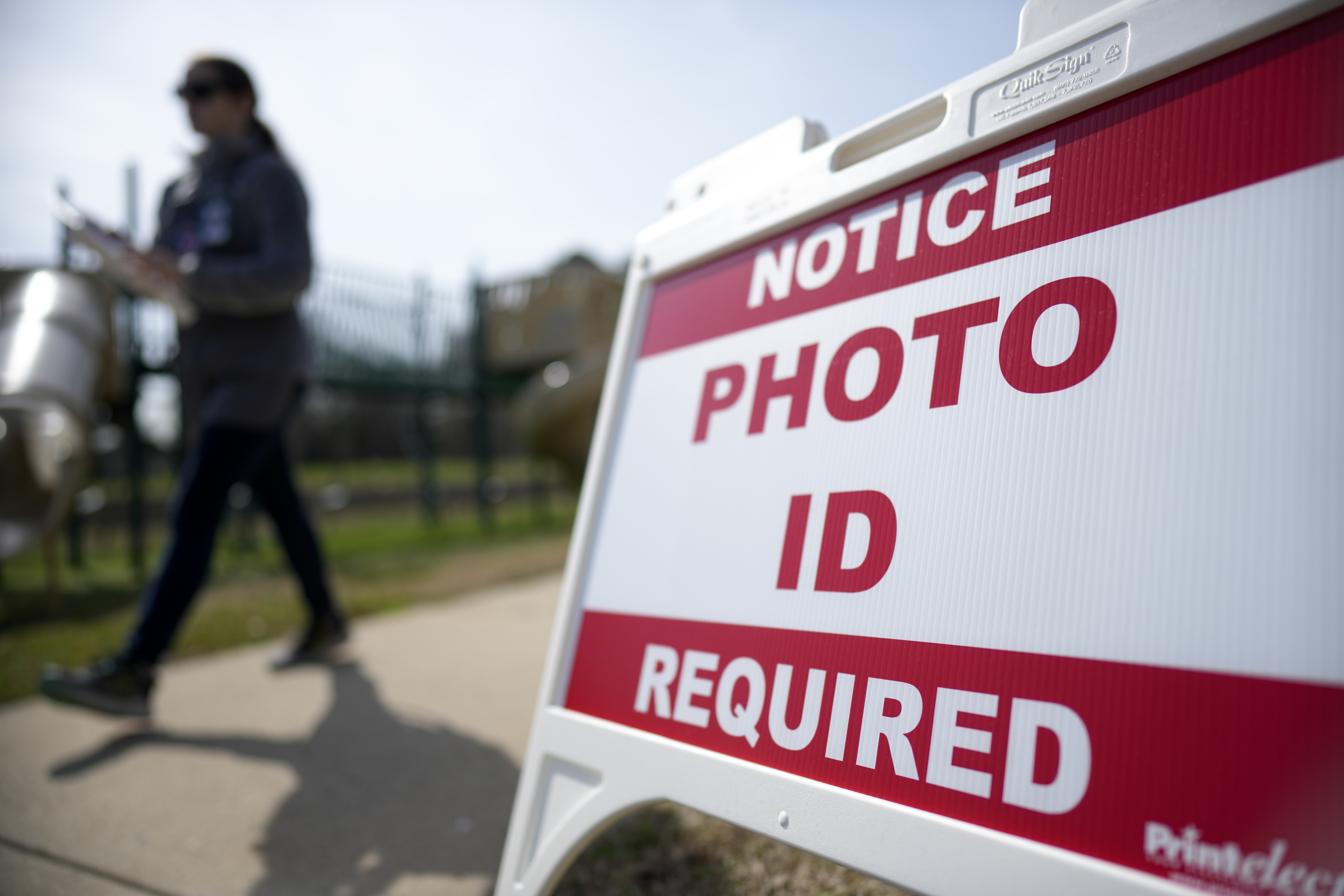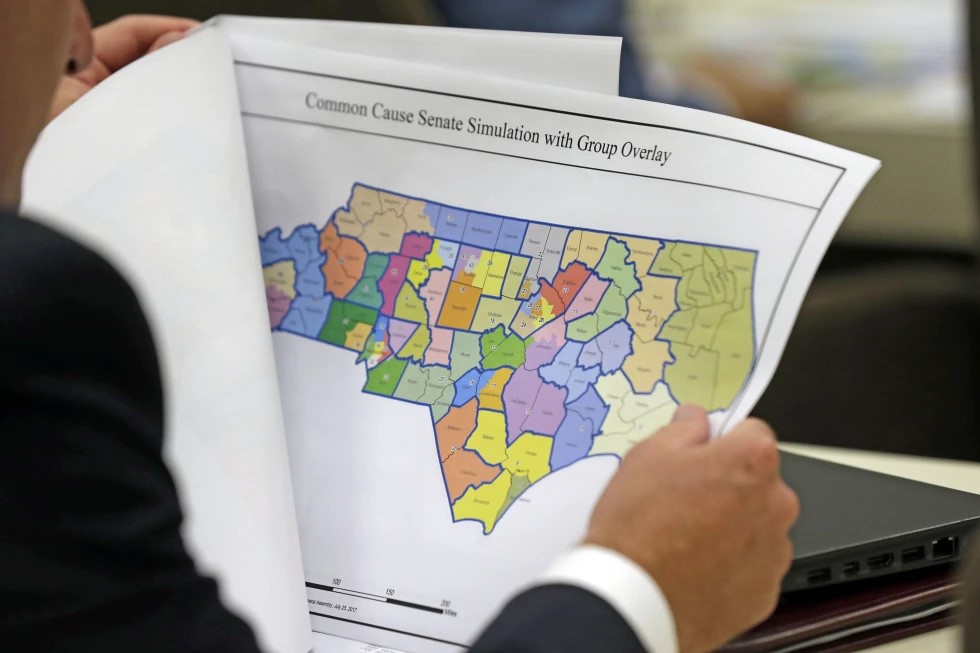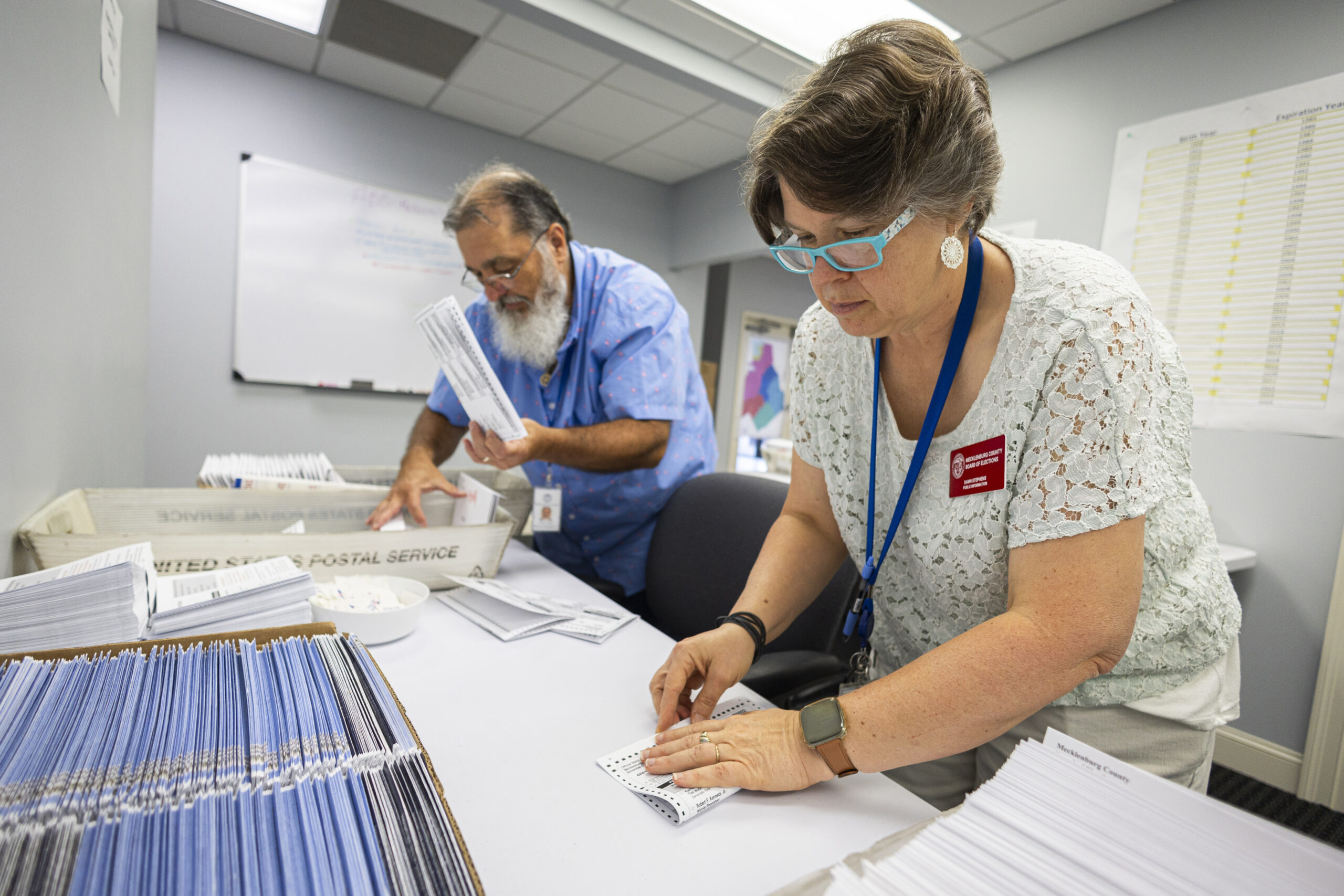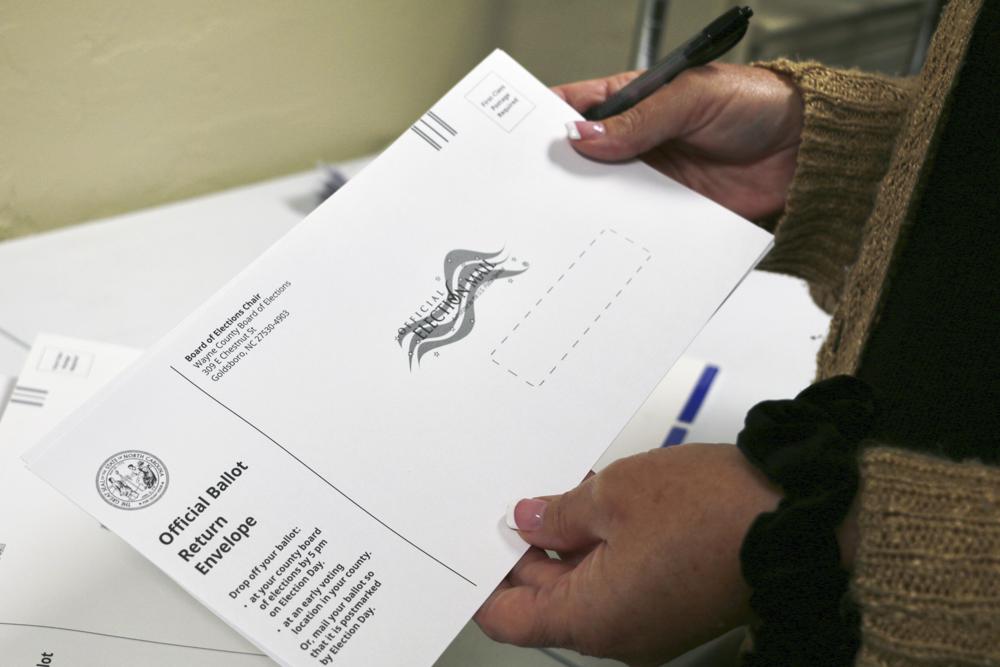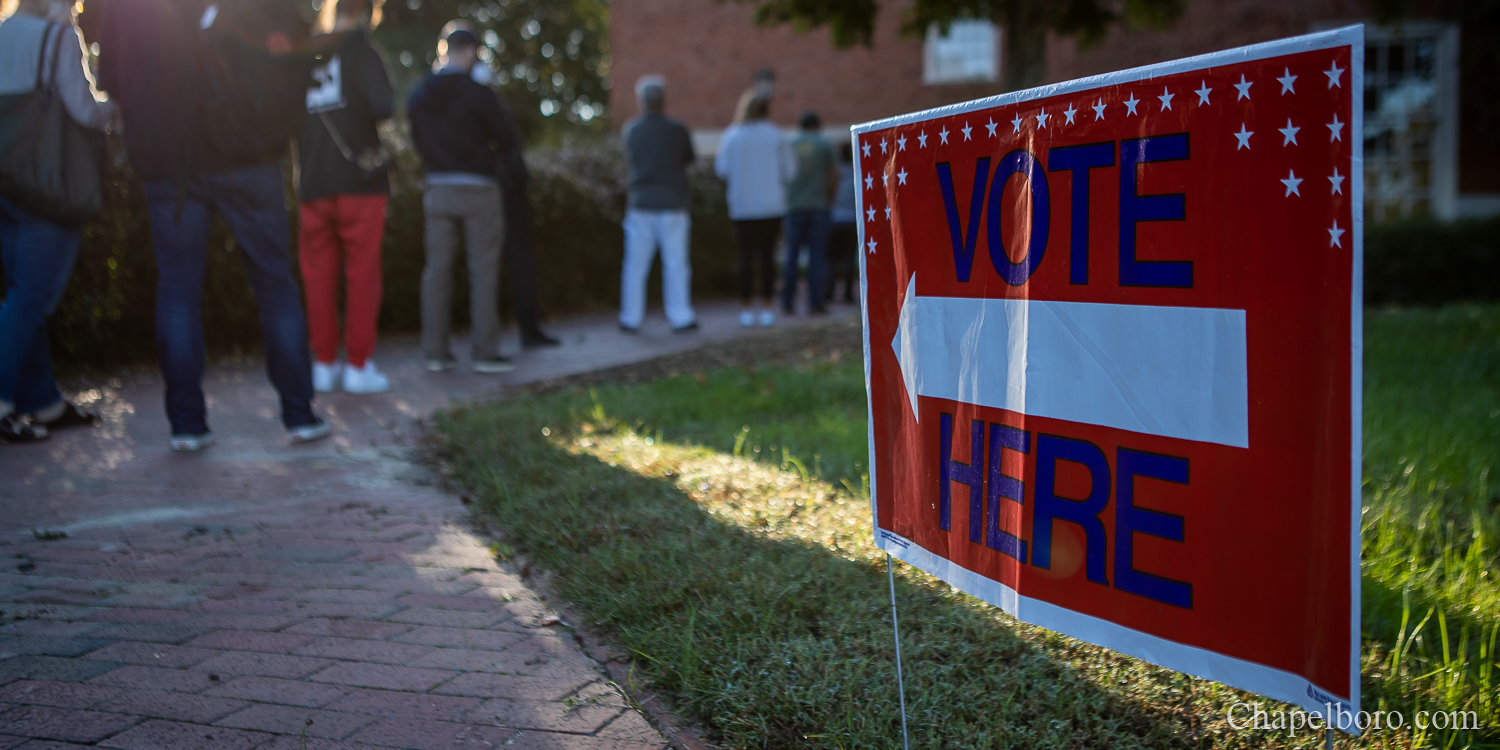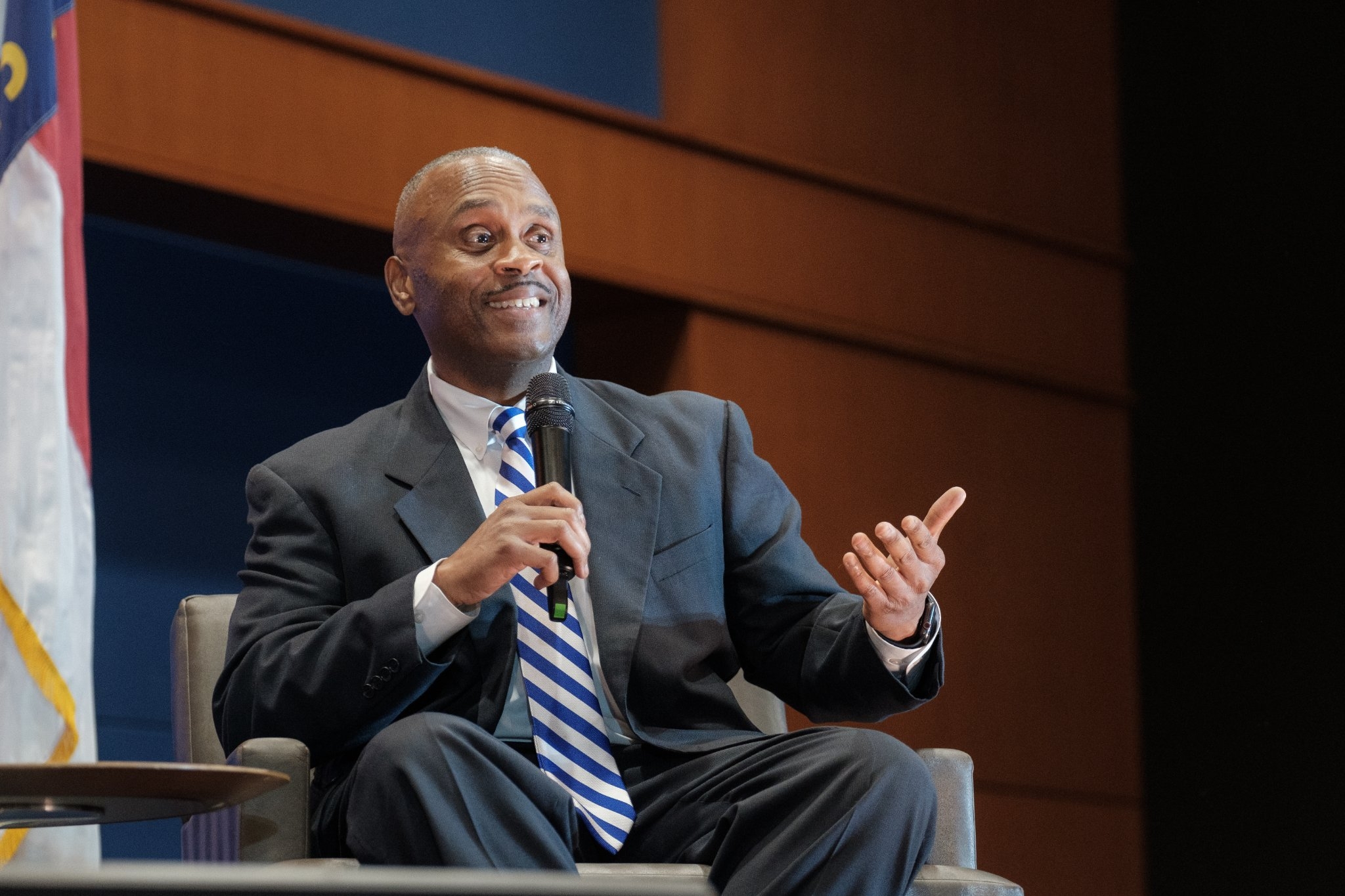North Carolina primary elections are not over yet, with two Republican runoff elections taking place in May, but many state officials are turning their attention to November for the general elections. And some Democratic leaders are arguing this could be North Carolina’s most consequential election in recent history.
State House Minority Leader and Chatham County representative Robert Reives joined 97.9 The Hill the week after primary Election Day to reflect on the results and share how candidates will begin transitioning to focusing on November’s matchups. He also shared thoughts on the challenges of directly connecting with voters who are not engaged or not supportive of a candidate’s party, as well as concerns for the future of public education based on one primary election result.
Below is a transcript of Reives’ conversation with 97.9 The Hill’s Andrew Stuckey, which has been lightly edited for clarity. To listen to their full conversation, click here.
Andrew Stuckey: Now that we’ve had a little bit of time to process it, what are your reactions?
Rep. Robert Reives: They were interesting to say the least. On [Democrats’] side, I don’t think there were any real surprises on the statewide level. The Republican side… I would say from the state House all the way up to the Council of State levels, there were some real surprises and some real indicators. And I would say if you asked me the single most surprising thing that happened from that Tuesday evening when results came in to 24 hours later [is that on] Wednesday, there was a report by the North Carolina Chamber sounding an alarm bell saying, ‘We’re in trouble, and we’ve got to be conscious of this.’ It was a really interesting article because, you know, it’s not secret. The chamber leans kind of conservatively in their support of candidates, things like that with the business interests. It was nice for them to all but say that if you want to save business in North Carolina, it’s probably going to be these elections you need to pay attention to.
Stuckey: How do you rally people to understand the urgency of that when so many messages come across as, ‘Everything is the most important thing?’
Reives: Well, I think the hard part for us is just really getting through all the noise. Like when you really think about it and you break down how campaigns have been run, we’ve accelerated over the last seven years in a way that eclipses the prior 100 years. It’s just really, really hard to cut through the disinformation. The good thing is, it actually goes back to what our strength is as a party: getting out and talking to people. But the bad thing is, you have got to get the bodies to go out and educate people. Because really what it is, is education at this point.
What I found is: once we get a chance to talk to people and explain the issues, once you explain to them the connections — who fixes their potholes, who makes sure that the schools are funded — then we get those votes. No ifs, ands, or buts about it. Our problem is getting there to do that. And just as the chamber and some other groups sounded the alarm bell last week, we can depend on the Republicans to come up with some brand new social issue that is suddenly going to be the alarmist bell for them going into the election. So the question is going to be, are people going to listen and care about the issues that will actually change what food goes on their table, how much money they make, how much they’re able to save? A huge problem that we’re having now is retirees not having enough money in their savings. Are they going to care about those issues? Or are they going to care about the hot topic, social issue of the week that’s probably never going to affect them in their lifetimes? If we can get them to understand about the issues that matter, we’re going to win. If we can’t get our bodies out there to make people understand that, you know, then we’re going to be in pretty dire straits come January.
Stuckey: When you say get our bodies out there, what does that look like in the next, you know, six months?
Reives: What it looks like is people as a whole are going to have to get out. I think one of the problems that I’ve seen on the Democratic side is under everybody understanding what their role is and that they’ve got a duty. This isn’t one of those things that you can sit out. This isn’t one of those things where you can say, ‘Well, John Smith’s the one running for office, so John Smith can worry about knocking doors. John Smith can worry about making phone calls. John Smith can worry about sending mailers.’ What we’re going to need is people who care about the things that we care about. Everybody, whether you’re eight [years-old] or 98, is going to have to get out, knock on the doors of their neighbors, of their friends, talk to their families around the table and say, ‘Hey guys, this is what’s at stake during this election.’
And that’s what I mean about getting the bodies out, because it’s not comfortable. Nobody likes that. People don’t like confrontation, generally, [and] people don’t like having to engage about politics. But we’re really at a point now where that’s [what is needed], because people have lost their circles of trust. It used to be all of us could cut on the news and we listened to Dan Rather, we listened to Walter Cronkite and we felt like we were getting an unbiased voice telling us what was going on in the world. Well, now everybody’s in their silos. And so the only people that [voters] trust are people that they know and know well. So, the people that they know and know well have to come to them and say, ‘Hey, I know this is what you believe. I know this is what you’ve been hearing. Here is the truth about how this works and how it connects, why your vote is important and why we’re going to need you going forward.’
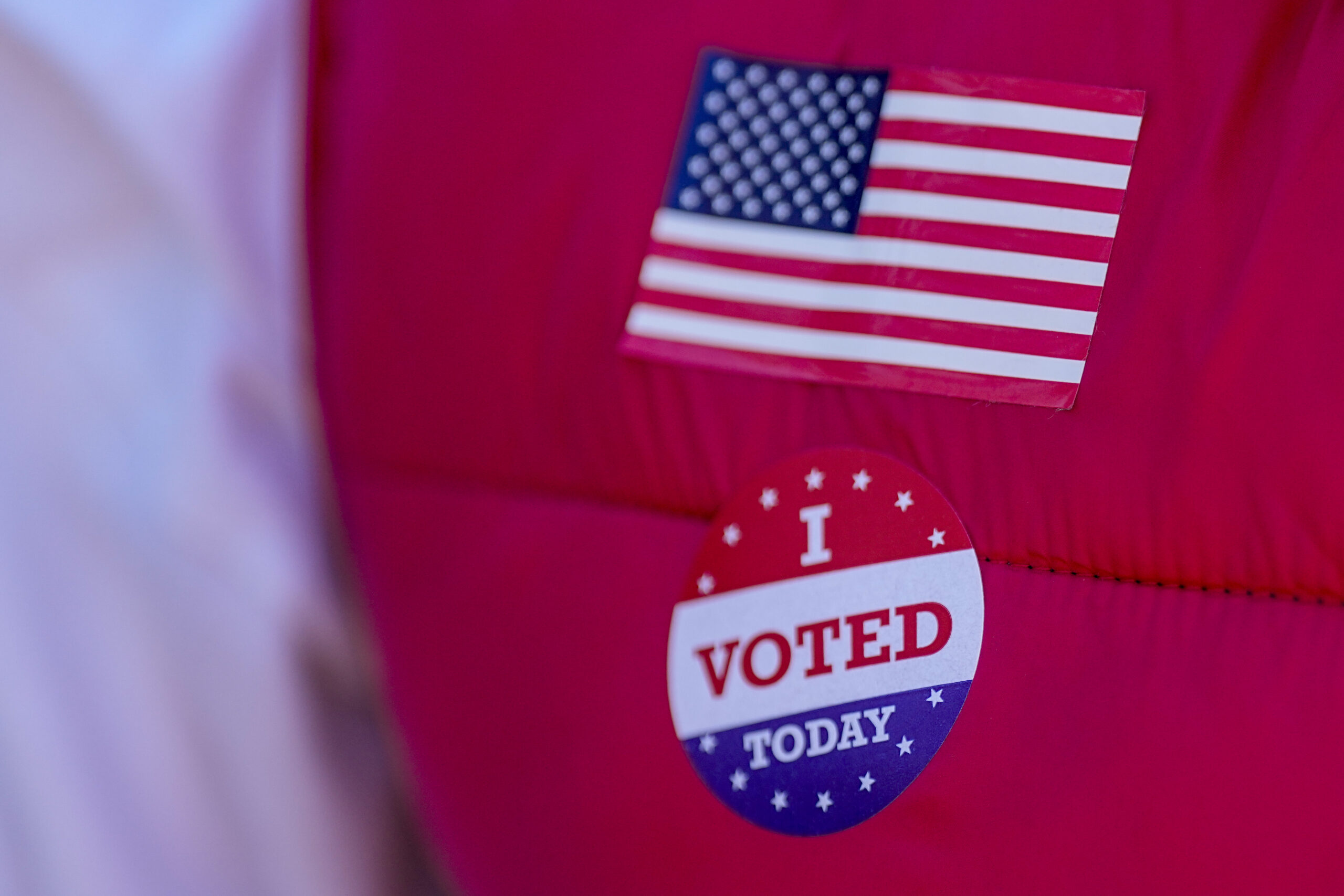
Ron Worley, candidate for Gaston County commissioner, displays an I Voted Today sticker on Super Tuesday at the entrance to a polling location Tuesday, March 5, 2024, in Belmont, N.C. (Photo via AP Photo/Chris Carlson.)
Stuckey: We started there talking about real reaction to the primary elections, but as we’ve talked about before… it’s kind of just all general election at this point. We did, as you said, got some moderately surprising results. But the kind of conversation around these elections is very much a general election conversation even prior to those primaries. What are the next few weeks or the next month like for you between these primary elections and then the start of the short session?
Reives: I mean, at this point, every month is October. What that means is, you’ve got to take every single day and use every single minute that you’ve got available to do things. My campaign staff and I were talking, going forward, about doing things across the state. We’re talking about what we’ve got to do, obviously, in district. It’s just a lot of work. I mean, when you look at the last couple of election results… you’ve basically got 5.5 million people who are participating in a voting franchise. We expect that to be a larger number this year. So if you say 6 million to 6.5 million people, [we’ve] just got to figure out how to get to them — because, again, it is shocking in some senses what people’s ideas are.
There was a poll this morning with WRAL that was talking about the fact that nobody likes any candidates. So, a lot of what we got to do [as a party] is make people understand it’s a binary choice. This isn’t going to be one of those things where [if you say], ‘Hey, if I sit out this election, then something good’s going to happen.’ When you sit out the election, somebody that you don’t like just got a vote. We’re trying to make people understand, one, there’s no such thing as a perfect candidate. Two, you’ve got to find a candidate that advances the most things that you care about. And I really believe in this election, it’s going to be a pretty easy choice because, again, if you care about what’s going on with your families, with your friends, with the economy, with the food on your table, I think it’s a pretty simple choice. You know, if you care about just staying angry, fighting against everything all the time, then you know you’re going to make other choices. Right now, what I care about is making this state a state that my kids want to stay in when they get out of school, want to work in, want to come back to and want to invite other people to.
Stuckey: What’s the best way people could get involved right now in March?
Reives: Right now, immediately go contact your local parties. Go contact advocacy organizations that align with your beliefs and ask them where you can help. Tell them what you like to do and then ask them how you can help. Because there’s a job for everybody. If you’re the biggest introvert in the world, there’s something for you to do. If you’re the biggest extrovert in the world, there’s something for you to do. If you’ve never done politics before, there’s something for you to do… but you need to do something. You cannot afford to look back 10 years from now at this particular election and your contribution was sitting at home. It’s not going to be enough to just vote — even though we need you to vote. It’s not going to be enough just to give money. It’s not going to be enough [to say], ‘I took an hour out between March and November and I went and called five people.’ I mean, you’ve got to find something that you do and you got to treat it like a second job.
Stuckey: Is there anything that you wanted to mention that we haven’t gotten to yet regarding elections?
Reives: Well, [there is] one of the races that I think really sounded the alarm bell for a lot of people that I will concentrate on, because it’s really the biggest issue of the election. I don’t know if it’s going to be the biggest issue that people care about, but you’ve got a weird confluence of events. You had the bill passed that’s going to give a lot of public education money — in terms of vouchers to wealthy people to have their kids in private school — and we’ve seen how that’s crashed a lot of state budgets throughout the country. Well, you now have a candidate on the Republican side running for [state] superintendent, [Michelle Morrow], who does not believe in public education at all. Like, is an avowed [candidate saying] ‘I don’t believe in public education,’ even though she’s running to be the head of public education for the state.
So, if you put together the biggest gutting of public education that’s ever happened in the history of this state with a person who wants to further gut it… you’re literally talking about. within the next four years. having nothing but a skeleton left of our public schools. I’m hoping people recognize that because whoever you are — especially if you’re in a rural area — you’re not going to have access to these [private] schools. And if the fee for this private or this charter school is $10,000, for instance… if the state gives you $2,000, that’s helpful if you’re rich. It does nothing for you to make up that $8,000 if you’re working class. I hope people pay really close attention to that.
Featured photo via the Committee to Elect Robert T. Reives II.
Chapelboro.com does not charge subscription fees, and you can directly support our efforts in local journalism here. Want more of what you see on Chapelboro? Let us bring free local news and community information to you by signing up for our newsletter.

